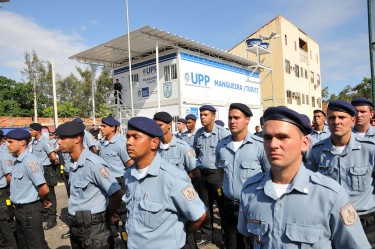This post is part of our special coverage International Relations & Security.

The 18th Rio UPP was launched in November 2011 in the Mangueira neighborhood which has 20,000 inhabitants. Image by SEASDH on Flickr (CC BY-NC-SA 2.0).
In recent years, the state government of Rio de Janeiro, Brazil, has adopted a security policy based on the installation of Pacifying Police Units (Unidades de Polícia Pacificadoras), known as UPPs. The aim of the UPP strategy [pt] is to place permanent police units in favelas (shanty towns) to tackle crime and promote social policies.
Since December 2008, 18 different favelas out of almost 1,000 in the capital city of Rio have received UPPs. In an article for Rede Brasil Atual [pt], Maurício Thuswohl argues that the UPPs have been placed in strategic areas:
“O desenho traçado pelas UPPs no mapa do Rio evidencia a intenção do governo de criar um cinturão de segurança nos bairros com maior poder aquisitivo e nas áreas da cidade onde ocorrerão eventos e concentração de turistas estrangeiros durante a Copa do Mundo de 2014 e as Olimpíadas de 2016.”
The attempt to establish UPPs in Rocinha, however, which is Rio’s most populated favela, has so far been unsuccessful. In order for UPPs to be established in this part of the city, the Special Police Operations Battalion (BOPE, in Portuguese) has had to undertake a heavily armed operation. This operation has been ongoing in Rocinha since 13 November 2011, but has still not been able to clear the way for the UPPs.
According to an article published by Mundo Real, an organization that is active in the community, widespread corruption and social inequality are ultimately the reasons why the UPP strategy will not work in Rocinha.
The video below shows the ‘occupation’ of Rocinha, posted to YouTube by BlogdaPacificacao on 22 November, 2011:
Some degree of success?
Nevertheless, UPPs have achieved a degree of success. Official data [pt] reveals a drop in Rio’s crime rate and UPP officials have managed to engage with the community. One such example is policewoman Rafaela Malta [pt], who teaches ballet to 70 girls from the Cidade de Deus favela, as shown in video below uploaded on March 7, 2012:
A complementary project known as UPP Social [pt] has also been launched to strengthen ties between such communities and the state. Corinne Cath, however, in an article for the organization RioOnWatch , argues that the priorities of the state are not the same as those of the favela’s residents:
“A second conflict that arises is the difference in priorities held by UPP Social and the community. UPP Social has determined that the focus should be on improving garbage collection, the formalization of payments for electricity (whereby residents now pay their electricity and other utility bills), and the improvement and renovation of public space.
The three primary demands of the community, however, are education, access to health care and a change in the attitude of the police towards the inhabitants of Vidigal and Chácara do Céu. Several representatives of the community described the attitude of the UPP police officers as being the same as that of the ‘normal’ police that interacted with the community when it was still controlled by drug gangs.”
According to Rafael Nunes in an article for Agência de Notícias das Favelas (Favela’s Agency Press) [pt] the state’s strategy is to promote law enforcement together with private activities and services, and these measures have already affected residents:
“…O problema é que uma conta de luz social, que no início não passava de quinze reais e de repente saltou para trezentos reais, pode determinar se uma pessoa vai poder ou não continuar vivendo num determinado local com dignidade.. A coerção e a intimidação por parte de agentes do governo municipal, com a ameaça de prejuízos jurídicos e materiais, nos foram contados como uma constante para pressionar a saída desses moradores e a entrega dos terrenos, que na maioria das vezes não passa as indenizações dos vinte mil reais.”
Self-determination
Rogério Dias points out in his blog No Foco em Debate [pt] that favela residents are often not heard by the media:
“No que diz respeito à cobertura da grande imprensa, me parece que um lado muito importante da história não foi ouvido e, se foi, me parece que foi sub-valorizado: o lado dos moradores. O que eles acham? Com certeza estão felizes com a saída dos traficantes, mas a presença permanente da força de repressão do estado também não é incômoda? Saem homens armados e entram outros homens armados, e realmente não sei o que é pior para aquelas pessoas…”
Because the UPP approach is a security policy that is treated as an ‘intervention’ or ‘pacification’ measure, it could also compromise the right of self-determination. Eduardo Tomazine Teixeira raises this possibility in an article for Passa Palavra [pt]:
“…(se nota) o fim da presença ostensiva da criminalidade armada nos espaços ocupados. Evidentemente, ainda é cedo para tirar conclusões mais definitivas, mas, a manter-se este quadro, as condições de vida da população destes espaços terão mudado significativamente, e terão mudado também as condições de luta pela autodeterminação sobre os seus espaços e de mobilização política de maneira geral.”
 This post and its translations to Spanish, Arabic and French were commissioned by International Security Network (ISN) as part of a partnership to seek out citizen voices on international relations and security issues worldwide. This post was first published on the ISN blog, see similar stories here.
This post and its translations to Spanish, Arabic and French were commissioned by International Security Network (ISN) as part of a partnership to seek out citizen voices on international relations and security issues worldwide. This post was first published on the ISN blog, see similar stories here.






1 comment